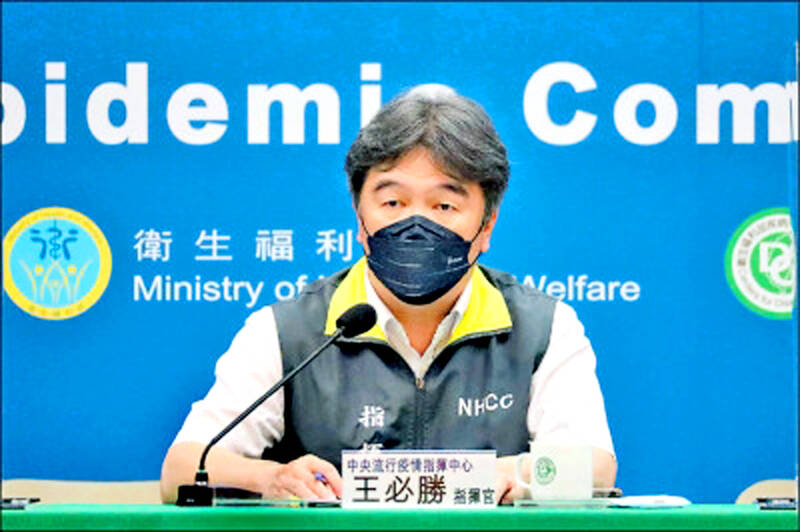A new wave of infections of the Omicron variant of SARS-CoV-2 might be incoming, the Central Epidemic Command Center (CECC) yesterday said, as it reported 14,162 new local COVID-19 cases, a 37 percent increase compared with Monday last week.
Centers for Disease Control (CDC) Director-General Chou Jih-haw (周志浩) said 72 imported COVID-19 cases and 14 deaths were confirmed yesterday.
Deputy Minister of Health and Welfare Victor Wang (王必勝), who heads the CECC, said that 120,755 new local cases were confirmed last week, a 12.6 percent increase over the previous week.

Photo: CNA
However, daily cases in the past few days have increased by 20 to 30 percent compared with the previous week, showing that cases were not just increasing, but increasing faster, he said.
“We believe another wave of infections will occur,” he said.
“Our preliminary projection is that the average daily local cases in the peak week of [the wave] would be about 30,000 local cases per day,” Wang said, adding that the peak would likely be in early February, and would be Taiwan’s third wave of Omicron infections.

Photo courtesy of CECC
As many places in Taipei were crowded at the weekend due to Christmas celebrations, New Year’s Eve events this weekend would likely also be packed, he said.
The center urges people to wear a mask when attending crowded events in which maintaining social distancing is difficult, avoid eating and drinking, and to bring hand sanitizer, he said.
People who have a fever, respiratory symptoms, diarrhea, or loss of taste or smell should avoid attending New Year’s Eve events, he said.
People practicing self-health management or self-disease prevention should test negative for COVID-19 before attending, while unvaccinated children and the elderly are also advised not to attend.
CDC Deputy Director-General Philip Lo (羅一鈞) said that of the sequenced local cases last week, 82 percent had the Omicron BA.5 subvariant, indicating that it is still the dominant strain circulating in Taiwan, while 12 percent had BA.2.75.
Of the imported cases, 37 percent had BA.5, 32 percent BA.2.75, 15 percent BQ.1 and 8 percent each BF.7 and XBB, he said.
As people are worried about new strains imported from China, Lo said the seven sequenced cases from China last week were two people infected with BF.7 and five with BA.5, which is similar to the proportions in China.
He said the CECC would continue to monitor for new strains.
Regarding panic buying of over-the-counter fever medicine, likely influenced by the COVID-19 surge in China, Wang said that the Food and Drug Administration (FDA) yesterday afternoon called a meeting with local drugmakers authorized to produce acetaminophen drugs for pain and fever relief, to ascertain current stocks of the drugs and the ingredient supply for the next few months.
He said the center would first ensure healthcare facilities have enough acetaminophen, as people usually seek medical attention when feeling ill, and hopefully if supplies of the drug remain sufficient, the government would not need to impose restrictions or institute a real-name-based rationing scheme for buying the drug.
However, usually a wave of infections lasts about three to four months, so the discussions at the FDA meeting must also consider a possible supply shortage in the upcoming months, he said.
Lo said there are still about 290,000 courses of the oral anti-viral Paxlovid, which is expected to last 152 days, and about 81,000 courses of molnupiravir, expected to last 232 days.

Taipei has once again made it to the top 100 in Oxford Economics’ Global Cities Index 2025 report, moving up five places from last year to 60. The annual index, which was published last month, evaluated 1,000 of the most populated metropolises based on five indices — economics, human capital, quality of life, environment and governance. New York maintained its top spot this year, placing first in the economics index thanks to the strength of its vibrant financial industry and economic stability. Taipei ranked 263rd in economics, 44th in human capital, 15th in quality of life, 284th for environment and 75th in governance,

The Sports Administration yesterday demanded an apology from the national table tennis association for barring 17-year-old Yeh Yi-tian (葉伊恬) from competing in the upcoming World Table Tennis (WTT) United States Smash tournament in Las Vegas this July. The sports agency said in a statement that the Chinese Taipei Table Tennis Association (CTTTA) must explain to the public why it withdrew Yeh from the WTT tournament in Las Vegas. The sports agency said it contacted the association to express its disapproval of the decision-making process after receiving a complaint from Yeh’s coach, Chuang

Control Yuan Secretary-General Lee Chun-yi (李俊俋) tendered his resignation last night, admitting that he had misused a government vehicle, as reported by media. His resignation was immediately accepted by the Control Yuan. In a statement explaining why he had resigned, Lee apologized for using a Control Yuan vehicle to transport his dog to a pet grooming salon on May 20. The issue first came to light late last month, when TVBS News reported that Lee had instructed his driver to take the dog to the salon. The news channel broadcast photos that it said were taken by an unnamed whistle-blower, which purportedly showed the

A former officer in China’s People’s Liberation Army (PLA) who witnessed the aftermath of the 1989 Tiananmen Square massacre has warned that Taiwan could face a similar fate if China attempts to unify the country by force. Li Xiaoming (李曉明), who was deployed to Beijing as a junior officer during the crackdown, said Taiwanese people should study the massacre carefully, because it offers a glimpse of what Beijing is willing to do to suppress dissent. “What happened in Tiananmen Square could happen in Taiwan too,” Li told CNA in a May 22 interview, ahead of the massacre’s 36th anniversary. “If Taiwanese students or